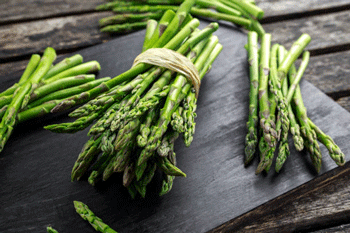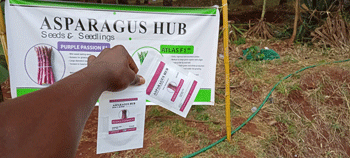
Asparagus a unique perennial flowering vegetable for Nakuru Farmers
Asparagus is a crop that is drawing curious interest for farmers in Nakuru County. The crop has been in the farming circles for quite some time, unfortunately it has not been exploited by many farmers in Kenya. Farmers practicing this farming craft are smiling all the way to the bank, thanks to the good prices the crop fetches in the export market with a kilogram retailing relatively between Ksh 600 to Ksh 800.
The story goes that back in 1987 Benson Chege, then the secretary of Kigogo Farmers’ Group in Gilgil chanced upon the crop and used it as fodder for his livestock. It was until his niece, who was working for a local flower growing company, saw the plant during a visit and told him that it was a major export crop for the company she was working for. She convinced him that the local farmers could grow it for the local market too. On her next visit, she brought some seeds to the uncle. He planted and tended it as directed by the niece. A tourist hotel in Naivasha bought all his produce offering him a steady income. Other farmers in the area got wind of the same and joined the bandwagon.
Nathan Kamau is one lucky farmer who joined the bandwagon; for him, he came across the crop while supplying cabbages and red onions to a restaurant, where he met a client who was in need of fresh asparagus for export. He carried out more research about the crop and acquired quality seeds for planting.
Asparagus can be grown from seeds or crowns. It grows best in regions with hot sunny days and cool nights, requires 90– 150 days of cold temperature to break dormancy. It is a perennial vegetable that is consumed due to its nutritious and medicinal benefits. It is a perennial plant meaning it can be harvested for many years without replanting. Depending on growth, care and climatic factors, a farmer can harvest asparagus from the same plant for 15 to 20 years. They grow to a height of between 100cm and 150cm, has branched feathery foliage with stems tremendously changed the financial status of most of the farmers in this area. I grow it on a 2-acre piece of land and I am in the plans of expanding my area of production though gradually in the coming days,” Kamau explained.
His production has been increasing since he delved into farming the crop, his first production was 20 kilos per week but this has changed as he manages to garner 100 to 150kg per week depending with the variety. Besides containing sugar and fiber, they also contain high amounts of vitamin K, which is required in blood clotting and healthy bones. They also contain other macronutrients such as iron, zinc, and that are stout. Asparagus varieties grown in the country are mostly Jersey King F1, Mary Washington, Dorbone, Huchel, Staudenauslese, and Jersey Giant F1.
“They are high yielding and are available in three colours; purple, green and white. The shoots are the ones that are eaten, either raw or cooked. The purple asparagus contains much higher sugar and fiber levels than the white and green asparagus. They grow well planted in companion with tomatoes, where the tomatoes repel the asparagus beetle and asparagus prevent root nematodes that affect tomatoes.
Besides changing my fortune, tremendously changed the financial status of most of the farmers in this area. I grow it on a 2-acre piece of land and I am in the plans of expanding my area of production though gradually in the coming days,” Kamau explained.
His production has been increasing since he delved into farming the crop, his first production was 20 kilos per week but this has changed as he manages to garner 100 to 150kg per week depending with the variety.

Besides containing sugar and fiber, they also contain high amounts of vitamin K, which is required in blood clotting and healthy bones. They also contain other macronutrients such as iron, zinc, and it has riboflavin. They contain high amounts of folate, also known as folic acid, which is an important nutrient especially in pregnancy, whereby expectant mothers are given folate supplements in the early stages of pregnancy. Folate help in forming red blood cells, brain development, development of the neural system and general health of the growing baby in the womb.
Asparagus is quite an easy crop to grow and maintain since its doesn’t require much input. It takes around one and half years to mature depending on irrigation and crop management. The crop does not require a lot of rainfall, which means it is well suited for production in Nakuru, which receives moderate and sometimes below average rainfall.
Vegetables are increasingly being recognized as essential for food and nutrition security. They are providing a promising economic opportunity for reducing rural poverty and unemployment in developing countries. They are also key components of farming diversification. They are mankind’s most affordable source of vitamins and minerals needed for good health. Today, neither the economic nor nutritional power of vegetables is sufficiently realized. To reap from this economic power of the vegetables, farmers need to increase their investment in farm productivity including improved varieties and diversify their market.


